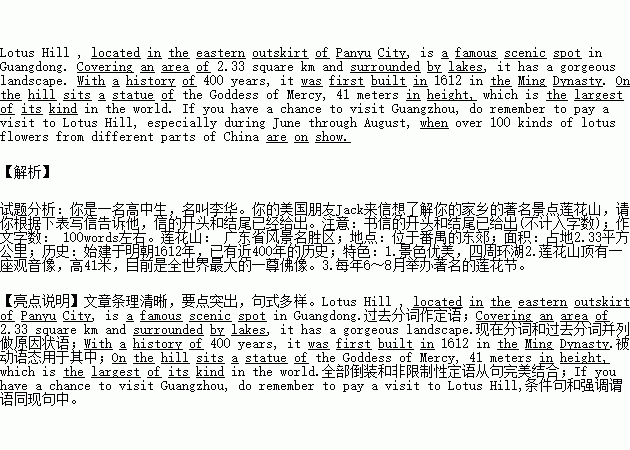ЬтФПФкШн
ЪщУцБэДя
ФуЪЧвЛУћИпжаЩњЃЌУћНаРюЛЊЁЃФуЕФУРЙњХѓгбJackРДаХЯыСЫНтФуЕФМвЯчЕФжјУћОАЕуСЋЛЈЩНЃЌЧыФуИљОнЯТБэаДаХИцЫпЫћЃЌаХЕФПЊЭЗКЭНсЮВвбОИјГіЁЃ
зЂвтЃКЪщаХЕФПЊЭЗКЭНсЮВвбИјГі(ВЛМЦШызжЪ§)ЃЛ
зїЮФзжЪ§ЃК 100wordsзѓгвЃЌзїЮФВЛвЊГЌЙ§Д№ЬтОэИјЖЈАцУцЕФЗЖЮЇЁЃ
СЋЛЈЩН | ЙуЖЋЪЁЗчОАУћЪЄЧј |
ЕиЕу | ЮЛгкЗЌиЎЕФЖЋНМ |
УцЛ§ | еМЕи2.33ЦНЗНЙЋРя |
РњЪЗ | ЪМНЈгкУїГЏ1612ФъЃЌвбгаНќ400ФъЕФРњЪЗ |
ЬиЩЋ | 1.ОАЩЋгХУРЃЌЫФжмЛЗКў 2.СЋЛЈЩНЖЅгавЛзљЙлвєЯёЃЌИп41УзЃЌФПЧАЪЧШЋЪРНчзюДѓЕФвЛз№З№ЯёЁЃ 3.УПФъ6ЁЋ8дТОйАьжјУћЕФСЋЛЈНк |
ЬсЪОДЪЃКНМЧјЃКoutskirt ЙлвєЯёЃКa statue of the Goddess of Mercy
Dear Jack,
I have received your e-mail. Now IЁЏm going to tell you something about the Lotus Hill.
_____________________________________________________________________
_____________________________________________________________________
_____________________________________________________________________
_____________________________________________________________________
_____________________________________________________________________
_____________________________________________________________________
Yours,
Li Hua
 ЭЈГЧбЇЕфФЌаДФмЪжЯЕСаД№АИ
ЭЈГЧбЇЕфФЌаДФмЪжЯЕСаД№АИ
